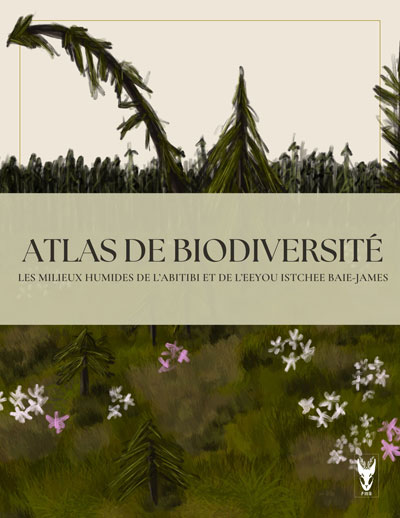
Étienne Laliberté
Membre régulier
Traits fonctionnels des plantes
Institut de recherche en biologie végétale (IRBV)
Université de Montréal
Jardin Botanique, bureau F438
4101 Sherbrooke Est
Montréal (Québec) Canada, H1X 2B2
(514) 343-6132
Page départementale ![]() | Page à l'IRBV
| Page à l'IRBV ![]() | Google Scholar
| Google Scholar ![]() | Twitter
| Twitter ![]()
FORMATION
- PhD (Ecology), University of Canterbury, New Zealand (2011)
- M.Sc. (Écologie), Université de Montréal, Canada (2006)
- B.Sc. (Botany), McGill University, Canada (2002)
THÈMES DE RECHERCHE
E. Laliberté est titulaire de la Chaire de recherche du Canada en biodiversité fonctionnelle végétale ![]() depuis janvier 2018.
depuis janvier 2018.
Nous étudions les traits fonctionnels des plantes afin de mieux comprendre et de prédire la distribution des espèces végétales le long de gradients environnementaux. L’emphase est sur la fertilité des sols et les traits fonctionnels reliés à l’acquisition et l’utilisation des éléments nutritifs. En particulier, nous étudions les interactions entre plantes et sols et les conséquences qu’ont ces interactions sur la biodiversité végétale et le fonctionnement des écosystèmes terrestres. Les connaissances obtenues s’appliquent entre autres au niveau de la restauration d’écosystèmes dégradés.
Le programme de recherche porte sur les interactions entre plantes et les propriétés abiotiques et biotiques des sols afin de mieux comprendre:
- l'influence de la fertilité des sols sur la biodiversité végétale;
- le développement d'écosystèmes terrestres, incluant la succession primaire;
- les traits fonctionnels des plantes expliquant la distribution d'espèces le long de gradients édaphiques.
La recherche permet d'améliorer la gestion des écosystèmes naturels et d'optimiser les stratégies de restauration écologique d'écosystèmes dégradés.
Champs d'expertise
- Écologie végétale
- Écologie fonctionelle
- Interactions plante-sol
DISTINCTIONS REÇUES
- Décembre 2016 - Étienne Laliberté remporte The New Phytologist Tansley Medal
 : The New Phytologist Tansley Medal is awarded annually in recognition of an outstanding contribution to research in plant science by an individual in the early stages of their career (including students and any researcher with up to five years’ experience since gaining/defending their PhD). The winner recives a prize of £2000 (GBP) and authors a short review, published in New Phytologist, accompanied by an Editorial. The winner of the 2016 Tansley Medal for excellence in plant science is Étienne Laliberté, of the University of Montreal, Canada. Etienne's Tansley insight (or editorial) is titled ‘Below-ground frontiers in trait-based plant ecology’
: The New Phytologist Tansley Medal is awarded annually in recognition of an outstanding contribution to research in plant science by an individual in the early stages of their career (including students and any researcher with up to five years’ experience since gaining/defending their PhD). The winner recives a prize of £2000 (GBP) and authors a short review, published in New Phytologist, accompanied by an Editorial. The winner of the 2016 Tansley Medal for excellence in plant science is Étienne Laliberté, of the University of Montreal, Canada. Etienne's Tansley insight (or editorial) is titled ‘Below-ground frontiers in trait-based plant ecology’  .
.
Vous pouvez télécharger toutes mes références bibliographiques en format BibTeX, BibTeX-CSV, FRQNT ou EndNote
PUBLICATIONS
Livres
Aucun
Chapitres de livre
- Lambers, H., Clode, P., Hawkins, H.J., Laliberte, E., Oliveira, R.S., Reddell, P., Shane, M.W., Stitt, M., Weston, P. (2015) Metabolic adaptations of the non-mycotrophic Proteaceae to soils with low phosphorus availability. In Phosphorus Metabolism in Plants in the Post-Genomic Era: From Gene to Ecosystems. (Plaxton, W.C. and Lambers, H., Eds.) Wiley, Chichester, UK, pages 289-336
- Lambers, H., Shane, M.W., Laliberte, E., Swarts, N.D., Teste, F.P., Zemunik, G. (2014) Plant mineral nutrition. In Plant Life on the Sandplains in Southwest Australia, A Global Biodiversity Hotspot. (Lambers, H., Eds.) UWA Publishing, Crawley, Australia, pages 101-127
- Mucina, L., Laliberte, E., Thiele, K.R., Dodson, J.R., Harvey, J. (2014) Biogeography of kwongan: origins, diversity, endemism and vegetation patterns. In Plant Life on the Sandplains in Southwest Australia, A Global Biodiversity Hotspot. (Lambers, H., Eds.) UWA Publishing, Crawley, Australia, pages 35-79
Livres, numéros spéciaux et actes de colloques publiés à titre d'éditeur
Aucun
Articles révisés par un comité de lecture
- Wallis, C.I.B., Kothari, S., Jantzen, J.R., Crofts, A.L., St-Jean, S., Inamdar, D., Pablo Arroyo-Mora, J., Kalacska, M., Bruneau, A., Coops, N.C. et al. (2024) Exploring the spectral variation hypothesis for α- and β-diversity: a comparison of open vegetation and forests. Environmental Research Letters, 19(6)
- Crofts, A.L., Wallis, C.I.B., St-Jean, S., Demers-Thibeault, S., Inamdar, D., Arroyo-Mora, J.P., Kalacska, M., Laliberte, E., Vellend, M. (2024) Linking aerial hyperspectral data to canopy tree biodiversity: An examination of the spectral variation hypothesis. Ecological Monographs, 94(3)
- Guilbeault-Mayers, X., Laliberte, E. (2024) Root phosphatase activity is coordinated with the root conservation gradient across a phosphorus gradient in a lowland tropical forest. New Phytologist, 243(2):636 – 647
- Blanchard, F., Bruneau, A., Laliberte, E. (2024) Foliar spectra accurately distinguish most temperate tree species and show strong phylogenetic signal. American Journal of Botany, 111(4)
- Parasquive, V., Brisson, J., Laliberte, E., Chagnon, P.L. (2024) Limited impact of soil inocula from arbuscular and ectomycorrhizal-dominated sites on root morphology and growth of four tree seedling species from a temperate deciduous forest. Plant and Soil
- Osei Darko, P., Laliberte, E., Kalacska, M., Arroyo‐Mora, J.P., Gonzalez, A., Zuloaga, J. (2024) Phenospectral similarity as an index of ecological integrity. Frontiers in Environmental Science, 12
- Cloutier, M., Germain, M., Laliberte, E. (2024) Influence of temperate forest autumn leaf phenology on segmentation of tree species from UAV imagery using deep learning. Remote Sensing of Environment, 311
- Guilbeault-Mayers, X., Lambers, H., Laliberte, E. (2024) Coordination among leaf and fine-root traits along a strong natural soil fertility gradient. Plant and Soil
- Jantzen, J.R., Laliberte, E., Carteron, A., Beauchamp-Rioux, R., Blanchard, F., Crofts, A.L., Girard, A., Hacker, P.W., Pardo, J., Schweiger, A.K. et al. (2023) Evolutionary history explains foliar spectral differences between arbuscular and ectomycorrhizal plant species. New Phytologist, 238(6):2651 – 2667
- Kothari, S., Beauchamp-Rioux, R., Blanchard, F., Crofts, A.L., Girard, A., Guilbeault-Mayers, X., Hacker, P.W., Pardo, J., Schweiger, A.K., Demers-Thibeault, S. et al. (2023) Predicting leaf traits across functional groups using reflectance spectroscopy. New Phytologist, 238(2):549 – 566
- Wallis, C.I., Crofts, A.L., Inamdar, D., Arroyo-Mora, J.P., Kalacska, M., Laliberte, E., Vellend, M. (2023) Remotely sensed carbon content: The role of tree composition and tree diversity. Remote Sensing of Environment, 284
- Miraglio, T., Coops, N.C., Wallis, C.I.B., Crofts, A.L., Kalacska, M., Vellend, M., Serbin, S.P., Arroyo-Mora, J.P., Laliberte, E. (2023) Mapping canopy traits over Québec using airborne and spaceborne imaging spectroscopy. Scientific Reports, 13(1)
- Parasquive, V., Brisson, J., Guilbeault-Mayers, X., Laliberte, E., Chagnon, P. (2023) Contrasted root trait responses between saplings of an arbuscular and an ectomycorrhizal tree species in open field compared to forest conditions. Journal of Ecology, 111(8):1700 – 1710
- Kothari, S., Beauchamp-Rioux, R., Laliberte, E., Cavender-Bares, J. (2023) Reflectance spectroscopy allows rapid, accurate and non-destructive estimates of functional traits from pressed leaves. Methods in Ecology and Evolution, 14(2):385 – 401
- Carteron, A., Vellend, M., Laliberte, E. (2022) Mycorrhizal dominance reduces local tree species diversity across US forests. Nature Ecology & Evolution, 6:370-374
- Schweiger, A.K., Laliberte, E. (2022) Plant beta-diversity across biomes captured by imaging spectroscopy. Nature Communications, 13(1)
- Carteron, A., Cichonski, F., Laliberte, E. (2022) Ectomycorrhizal Stands Accelerate Decomposition to a Greater Extent than Arbuscular Mycorrhizal Stands in a Northern Deciduous Forest. Ecosystems, 25(6):1234 – 1248
- Hacker, P.W., Coops, N.C., Laliberte, E., Michaletz, S.T. (2022) Variations in accuracy of leaf functional trait prediction due to spectral mixing. Ecological Indicators, 136
- Teste, F.P., Lambers, H., Enowashu, E.E., Laliberte, E., Marhan, S., Kandeler, E. (2021) Soil microbial communities are driven by the declining availability of cations and phosphorus during ecosystem retrogression. Soil Biology and Biochemistry, 163
- Falster, D., Gallagher, R., Wenk, E.H., Wright, I.J., Indiarto, D., Andrew, S.C., Baxter, C., Lawson, J., Allen, S., Fuchs, A. et al. (2021) AusTraits, a curated plant trait database for the Australian flora. Scientific Data, 8(1)
- de Tombeur, F., Cornelis, J.-T., Laliberte, E., Lambers, H., Mahy, G., Faucon, M.-P., Turner, B.L. (2021) Impact of ecosystem water balance and soil parent material on silicon dynamics: insights from three long-term chronosequences. Biogeochemistry, 156(3):335 – 350
- Teste, F.P., Laliberte, E. (2021) A test of the Janzen-Connell hypothesis in a species-rich Mediterranean woodland. Ecosphere, 12(11)
- Carteron, A., Beigas, M., Joly, S., Turner, B.L., Laliberte, E. (2021) Temperate Forests Dominated by Arbuscular or Ectomycorrhizal Fungi Are Characterized by Strong Shifts from Saprotrophic to Mycorrhizal Fungi with Increasing Soil Depth. Microbial Ecology, 82(2):377 – 390
- de Tombeur, F., Laliberte, E., Lambers, H., Faucon, M.-P., Zemunik, G., Turner, B.L., Cornelis, J.-T., Mahy, G. (2021) A shift from phenol to silica-based leaf defences during long-term soil and ecosystem development. Ecology Letters, 24(5):984 – 995
- Carteron, A., Parasquive, V., Blanchard, F., Guilbeault-Mayers, X., Turner, B.L., Vellend, M., Laliberte, E. (2020) Soil abiotic and biotic properties constrain the establishment of a dominant temperate tree into boreal forests. Journal of Ecology, 108(3):931-944
- Laliberte, E., Schweiger, A.K., Legendre, P. (2020) Partitioning plant spectral diversity into alpha and beta components. Ecology Letters, 23(2):370-380
- Guilbeault-Mayers, X., Turner, B.L., Laliberte, E. (2020) Greater root phosphatase activity of tropical trees at low phosphorus despite strong variation among species. Ecology, 101(8)
- De Tombeur, F., Turner, B.L., Laliberte, E., Lambers, H., Mahy, G., Faucon, M.-P., Zemunik, G., Cornelis, J.-T. (2020) Plants sustain the terrestrial silicon cycle during ecosystem retrogression. Science, 369(6508):1245-1248
- Girard, A., Schweiger, A.K., Carteron, A., Kalacska, M., Laliberte, E. (2020) Foliar spectra and traits of bog plants across nitrogen deposition gradients. Remote Sensing, 12(15)
- Kalacska, M., Lucanus, O., Arroyo-Mora, J.P., Laliberte, E., Elmer, K., Leblanc, G., Groves, A. (2020) Accuracy of 3d landscape reconstruction without ground control points using different uas platforms. Drones, 4(2):1-26
- Schweiger, A.K., Lussier Desbiens, A., Charron, G., La Vigne, H., Laliberte, E. (2020) Foliar sampling with an unmanned aerial system (UAS) reveals spectral and functional trait differences within tree crowns. Canadian Journal of Forest Research, 50(10):966-974
- de Tombeur, F., Turner, B.L., Laliberte, E., Lambers, H., Cornelis, J.-T. (2020) Silicon Dynamics During 2 Million Years of Soil Development in a Coastal Dune Chronosequence Under a Mediterranean Climate. Ecosystems, 23(8):1614-1630
- Teste, F.P., Laliberte, E. (2019) Plasticity in root symbioses following shifts in soil nutrient availability during long-term ecosystem development. Journal of Ecology, 107(2):633-649
- Turner, B.L., Zemunik, G., Laliberte, E., Drake, J.J., Jones, F.A., Saltonstall, K. (2019) Contrasting patterns of plant and microbial diversity during long-term ecosystem development. Journal of Ecology, 107(2):606-621
- Png, G.K., Lambers, H., Kardol, P., Turner, B.L., Wardle, D.A., Laliberte, E. (2019) Biotic and abiotic plant–soil feedback depends on nitrogen-acquisition strategy and shifts during long-term ecosystem development. Journal of Ecology, 107(1):142-153
- Turner, B.L., Hayes, P.E., Laliberte, E. (2018) A climosequence of chronosequences in southwestern Australia. European Journal of Soil Science, 69(1):69-85
- Abrahão, A., Ryan, M.H., Laliberte, E., Oliveira, R.S., Lambers, H. (2018) Phosphorus- and nitrogen-acquisition strategies in two Bossiaea species (Fabaceae) along retrogressive soil chronosequences in south-western Australia. Physiologia Plantarum, 163(3):323-343
- Ramalho, C.E., Laliberte, E., Poot, P., Hobbs, R. (2018) Effects of fragmentation on the plant functional composition and diversity of remnant woodlands in a young and rapidly expanding city. Journal of Vegetation Science, 29(2):285-296
- Zemunik, G., Lambers, H., Turner, B.L., Laliberte, E., Oliveira, R.S. (2018) High abundance of non-mycorrhizal plant species in severely phosphorus-impoverished Brazilian campos rupestres. Plant and Soil, 424(1):255-271
- Lambers, H., Albornoz, F.E., Kotula, L., Laliberte, E., Ranathunge, K., Teste, F.P., Zemunik, G. (2018) How belowground interactions contribute to the coexistence of mycorrhizal and non-mycorrhizal species in severely phosphorus-impoverished hyperdiverse ecosystems. Plant and Soil, 424(1):11-33
- Birnbaum, C., Bissett, A., Teste, F.P., Laliberte, E. (2018) Symbiotic N2-Fixer Community Composition, but Not Diversity, Shifts in Nodules of a Single Host Legume Across a 2-Million-Year Dune Chronosequence. Microbial Ecology, 76(4):1009-1020
- Teste, F.P., Kardol, P., Turner, B.L., Wardle, D.A., Zemunik, G., Renton, M., Laliberte, E. (2017) Plant-soil feedback and the maintenance of diversity in Mediterranean-climate shrublands. Science, 355(6321):173-176
- Laliberte, E., Kardol, P., Didham, R.K., Teste, F.P., Turner, B.L., Wardle, D.A. (2017) Soil fertility shapes belowground food webs across a regional climate gradient. Ecology Letters, 20(10):1273-1284
- Laliberte, E. (2017) Below-ground frontiers in trait-based plant ecology. New Phytologist, 213(4):1597-1603
- Png, G.K., Turner, B.L., Albornoz, F.E., Hayes, P.E., Lambers, H., Laliberte, E. (2017) Greater root phosphatase activity in nitrogen-fixing rhizobial but not actinorhizal plants with declining phosphorus availability. Journal of Ecology, 105(5):1246-1255
- Albornoz, F.E., Burgess, T.I., Lambers, H., Etchells, H., Laliberte, E. (2017) Native soilborne pathogens equalize differences in competitive ability between plants of contrasting nutrient-acquisition strategies. Journal of Ecology, 105(2):549-557
- Shipley, B., De Bello, F., Cornelissen, J.H.C., Laliberte, E., Laughlin, D.C., Reich, P.B. (2016) Reinforcing loose foundation stones in trait-based plant ecology. Oecologia, 180(4):923-931
- Teste, F.P., Laliberte, E., Lambers, H., Auer, Y., Kramer, S., Kandeler, E. (2016) Mycorrhizal fungal biomass and scavenging declines in phosphorus-impoverished soils during ecosystem retrogression. Soil Biology and Biochemistry, 92:119-132
- Roy-Bolduc, A., Laliberte, E., Hijri, M. (2016) High richness of ectomycorrhizal fungi and low host specificity in a coastal sand dune ecosystem revealed by network analysis. Ecology and Evolution, 6(1):349-362
- Albornoz, F.E., Lambers, H., Turner, B.L., Teste, F.P., Laliberte, E. (2016) Shifts in symbiotic associations in plants capable of forming multiple root symbioses across a long-term soil chronosequence. Ecology and Evolution, 6(8):2368-2377
- Zemunik, G., Turner, B.L., Lambers, H., Laliberte, E. (2016) Increasing plant species diversity and extreme species turnover accompany declining soil fertility along a long-term chronosequence in a biodiversity hotspot. Journal of Ecology, 104(3):792-805
- Albornoz, F.E., Teste, F.P., Lambers, H., Bunce, M., Murray, D.C., White, N.E., Laliberte, E. (2016) Changes in ectomycorrhizal fungal community composition and declining diversity along a 2-million-year soil chronosequence. Molecular Ecology, 25(19):4919-4929
- Roy-Bolduc, A., Laliberte, E., Boudreau, S., Hijri, M. (2016) Strong linkage between plant and soil fungal communities along a successional coastal dune system. FEMS Microbiology Ecology, 92(10)
- Turner, B.L., Laliberte, E. (2015) Soil Development and Nutrient Availability Along a 2 Million-Year Coastal Dune Chronosequence Under Species-Rich Mediterranean Shrubland in Southwestern Australia. Ecosystems, 18(2):287-309
- Lambers, H., Hayes, P.E., Laliberte, E., Oliveira, R.S., Turner, B.L. (2015) Leaf manganese accumulation and phosphorus-acquisition efficiency. Trends in Plant Science, 20(2):83-90
- Laliberte, E., Lambers, H., Burgess, T.I., Wright, S.J. (2015) Phosphorus limitation, soil-borne pathogens and the coexistence of plant species in hyperdiverse forests and shrublands. New Phytologist, 206(2):507-521
- Zemunik, G., Turner, B.L., Lambers, H., Laliberte, E. (2015) Diversity of plant nutrient-acquisition strategies increases during long-term ecosystem development. Nature Plants, 1:--
- Kruger, M., Teste, F.P., Laliberte, E., Lambers, H., Coghlan, M., Zemunik, G., Bunce, M. (2015) The rise and fall of arbuscular mycorrhizal fungal diversity during ecosystem retrogression. Molecular Ecology, 24(19):4912-4930
- Sulpice, R., Ishihara, H., Schlereth, A., Cawthray, G.R., Encke, B., Giavalisco, P., Ivakov, A., Arrivault, S., Jost, R., Krohn, N. et al. (2014) Low levels of ribosomal RNA partly account for the very high photosynthetic phosphorus-use efficiency of Proteaceae species. Plant, Cell and Environment, 37(6):1276-1298
- Ramalho, C.E., Laliberte, E., Poot, P., Hobbs, R.J. (2014) Complex effects of fragmentation on remnant woodland plant communities of a rapidly urbanizing biodiversity hotspot. Ecology, 95(9):2466-2478
- Rader, R., Bartomeus, I., Tylianakis, J.M., Laliberte, E. (2014) The winners and losers of land use intensification: Pollinator community disassembly is non-random and alters functional diversity. Diversity and Distributions, 20(8):908-917
- Laliberte, E., Zemimik, G., Turner, B.L. (2014) Environmental filtering explains variation in plant diversity along resource gradients. Science, 345(6204):1602-1605
- Hayes, P., Turner, B.L., Lambers, H., Laliberte, E. (2014) Foliar nutrient concentrations and resorption efficiency in plants of contrasting nutrient-acquisition strategies along a 2-million-year dune chronosequence. Journal of Ecology, 102(2):396-410
- Shackelford, N., Hobbs, R.J., Burgar, J.M., Erickson, T.E., Fontaine, J.B., Laliberte, E., Ramalho, C.E., Perring, M.P., Standish, R.J. (2013) Primed for change: Developing ecological restoration for the 21st century. Restoration Ecology, 21(3):297-304
- Laliberte, E., Turner, B.L., Zemunik, G., Wyrwoll, K.-H., Pearse, S.J., Lambers, H. (2013) Nutrient limitation along the jurien bay dune chronosequence: Response to uren & parsons (2013). Journal of Ecology, 101(5):1088-1092
- Laliberte, E., Norton, D.A., Scott, D. (2013) Contrasting effects of productivity and disturbance on plant functional diversity at local and metacommunity scales. Journal of Vegetation Science, 24(5):834-842
- Laliberte, E., Lambers, H., Norton, D.A., Tylianakis, J.M., Huston, M.A. (2013) A long-term experimental test of the dynamic equilibrium model of species diversity. Oecologia, 171(2):439-448
- Laliberte, E., Grace, J.B., Huston, M.A., Lambers, H., Teste, F.P., Turner, B.L., Wardle, D.A. (2013) How does pedogenesis drive plant diversity? Trends in Ecology and Evolution, 28(6):331-340
- Kardol, P., De Deyn, G.B., Laliberte, E., Mariotte, P., Hawkes, C.V. (2013) Biotic plant-soil feedbacks across temporal scales. Journal of Ecology, 101(2):309-315
- Lambers, H., Ahmedi, I., Berkowitz, O., Dunne, C., Finnegan, P.M., Hardy, G.E.St.J., Jost, R., Laliberte, E., Pearse, S.J., Teste, F. (2013) Phosphorus nutrition of phosphorus-sensitive Australian native plants: threats to plant communities in a global biodiversity hotspot. Conservation Physiology, 1(1)
- Lambers, H., Cawthray, G.R., Giavalisco, P., Kuo, J., Laliberte, E., Pearse, S.J., Scheible, W.-R., Stitt, M., Teste, F., Turner, B.L. (2012) Proteaceae from severely phosphorus-impoverished soils extensively replace phospholipids with galactolipids and sulfolipids during leaf development to achieve a high photosynthetic phosphorus-use-efficiency. New Phytologist, 196(4):1098-1108
- Lambers, H., Bishop, J.G., Hopper, S.D., Laliberte, E., Zuniga-Feest, A. (2012) Phosphorus-mobilization ecosystem engineering: the roles of cluster roots and carboxylate exudation in young P-limited ecosystems. Annals of Botany, 110(2):329-348
- Laliberte, E., Tylianakis, J.M. (2012) Cascading effects of long-term land-use changes on plant traits and ecosystem functioning. Ecology, 93(1):145-155
- Laliberte, E., Turner, B.L., Costes, T., Pearse, S.J., Wyrwoll, K.-H., Zemunik, G., Lambers, H. (2012) Experimental assessment of nutrient limitation along a 2-million-year dune chronosequence in the south-western Australia biodiversity hotspot. Journal of Ecology, 100(3):631-642
- Laliberte, E., Shipley, B., Norton, D.A., Scott, D. (2012) Which plant traits determine abundance under long-term shifts in soil resource availability and grazing intensity? Journal of Ecology, 100(3):662-677
- Laliberte, E., Adair, E.C., Hobbie, S.E. (2012) Estimating Litter Decomposition Rate in Single-Pool Models Using Nonlinear Beta Regression. PLOS ONE, 7(9)
- Laughlin, D.C., Fule, P.Z., Huffman, D.W., Crouse, J., Laliberte, E. (2011) Climatic constraints on trait-based forest assembly. Journal of Ecology, 99(6):1489-1499
- Lambers, H., Finnegan, P.M., Laliberte, E., Pearse, S.J., Ryan, M.H., Shane, M.W., Veneklaas, E.J. (2011) Phosphorus nutrition of proteaceae in severely phosphorus-impoverished soils: Are there lessons to be learned for future crops? Plant Physiology, 156(3):1058-1066
- Tylianakis, J.M., Laliberte, E., Nielsen, A., Bascompte, J. (2010) Conservation of species interaction networks. Biological Conservation, 143(10):2270-2279
- Laliberte, E., Wells, J.A., Declerck, F., Metcalfe, D.J., Catterall, C.P., Queiroz, C., Aubin, I., Bonser, S.P., Ding, Y., Fraterrigo, J.M. et al. (2010) Land-use intensification reduces functional redundancy and response diversity in plant communities. Ecology Letters, 13(1):76-86
- Laliberte, E., Tylianakis, J.M. (2010) Deforestation homogenizes tropical parasitoid-host networks. Ecology, 91(6):1740-1747
- Laliberte, E., Norton, D.A., Tylianakis, J.M., Scott, D. (2010) Comparison of two sampling methods for quantifying changes in vegetation composition under rangeland development. Rangeland Ecology and Management, 63(5):537-545
- Laliberte, E., Legendre, P. (2010) A distance-based framework for measuring functional diversity from multiple traits. Ecology, 91(1):299-305
- Laliberte, E., Paquette, A., Legendre, P., Bouchard, A. (2009) Assessing the scale-specific importance of niches and other spatial processes on beta diversity: A case study from a temperate forest. Oecologia, 159(2):377-388
- Laliberte, E., Cogliastro, A., Bouchard, A. (2008) Spatiotemporal patterns in seedling emergence and early growth of two oak species direct-seeded on abandoned pastureland. Annals of Forest Science, 65(4):407p1-407p10
- Laliberte, E., Bouchard, A., Cogliastro, A. (2008) Optimizing hardwood reforestation in old fields: The effects of treeshelters and environmental factors on tree seedling growth and physiology. Restoration Ecology, 16(2):270-280
- Laliberte, E. (2008) Analyzing or explaining beta diversity? Comment. Ecology, 89(11):3232-3237
- Paquette, A., Laliberte, E., Bouchard, A., De Blois, S., Legendre, P., Brisson, J. (2007) Lac Croche understory vegetation data set (1998-2006): Ecological Archives E088-197. Ecology, 88(12):3209
Articles publiés dans des actes de colloque (proceedings)
- Doyon, P., Germain, M., Fotso Kamga, G.A., Laliberte, E., Bouroubi, Y., Chagnon, M. (2023) Study Beekeeping potential data and development of a decision support system involving a web mapping platform. In International Geoscience and Remote Sensing Symposium (IGARSS). 2321 – 2324
Rapports scientifiques, manuels et autres
- Laliberte, E., Bouchard, A., Cogliastro, A. (2006) Projet pilote de restauration de paysages forestiers au Parc national des îles-de-Boucherville. Technical report, Institut de recherche en biologie végétale
Thèses, mémoires et essais
- Laliberte, E. (2011) Land-use Intensification in grazing systems: plant trait responses and feedbacks to ecosystem functioning and resilience. Thèse de doctorat, School of Forestry, University of Canterbury, Australia
- Laliberte, E. (2006) Optimiser l’établissement d’arbres feuillus par la « facilitation artificielle » : l’effet des manchons protecteurs selon des facteurs environnementaux. Mémoire de maîtrise, Université de Montréal
Thèses, mémoires et essais supervisés
- Lefebvre, I. (2025) Suivi de la séquestration de CO2 aérien dans des sites en reforestation à l'aide de drones. Mémoire de maîtrise, Université de Montréal
- Tougas, G. (2024) Télédétection de la maladie corticale du hêtre à partir d'imagerie hyperspectrale aérienne. Mémoire de maîtrise, Université de Sherbrooke
- Png, G.K. (2017) Symbiotic nitrogen fixation during long-term ecosystem development: environmental constraints and ecological consequences. Thèse de doctorat, University of Western Australia
- Roy-Bolduc, A. (2016) La face cachée de la dune : Communautés fongiques du sol: dynamique, succession et interactions avec la végétation d’un écosystème dunaire côtier aux Îles de la Madeleine, Qc. Thèse de doctorat, Université de Montréal
- Ottaviani, G. (2015) Using a plant functional trait approach to determine dynamics of plant community assembly on granite outcrops of SouthwestWestern Australia. Thèse de doctorat, University of Western Australia
Articles non révisés par un comité de lecture
Aucun
<< | MembresReguliers | >>










